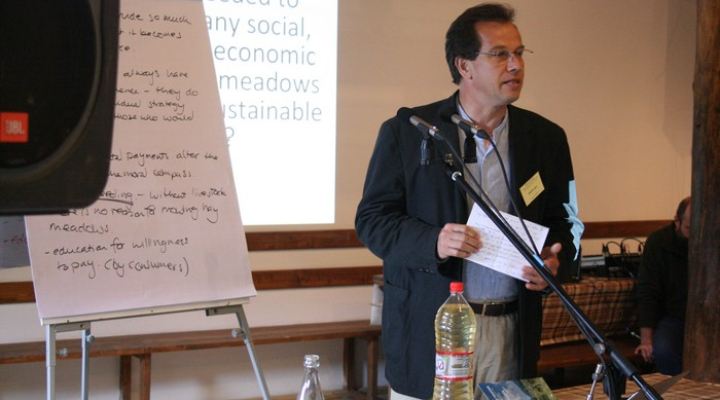On the mountain area meadows at Valea Boroş
The Pogány-havas Micro-regional Association organized an international conference on the subject of the economic, social and natural significance of the mountain area meadows from Valea Borşa. This was part of the association’s meadow protection project, which has the goal of raising awareness on the importance of this natural resource among meadow owners and decision makers.
The Pogány-havas Micro-regional Association considers the issue of the meadows as a priority due to the fact that, although European Union policies tend to emphasize the importance of preserving natural resources, in truth the situation is very different: meadow areas are shrinking and property owners don’t recognize the natural, economic and social resources they own. We value our meadows! is the slogan of the awareness raising campaign initiated by the association in 2012 as a continuation of a meadow protection campaign launched in 2009.
The subject was debated twice in Brussels, at events organized by DAHR MEP Csaba Sógor and the Pogány-Havas Micro-Regional Association. In the opinion of the MEP, every event like this – whether it’s held in Brussels or in Transylvania – is a step further in raising awareness regarding this subject. The Hungarian politician from Transylvania considers that when making their decisions the people, the property owners, the local and regional administrations and the European Union should take into consideration the protection of their natural habitat.
At the conference Csaba Sógor presented a case study written in 1972 by D.L. Meadows entitled The Limits to Growth that presented the threats and challenges we faced if we continued to exploit our planet’s natural resources irresponsibly. The second part of the study, written thirty years later, shows that the prognoses of the first part were alarmingly accurate: humanity faces water and food shortages and energy and economic crises. “Few of us thought in 1972 that the natural resources of our planet were limited and that the ways of our civilisation are harmful to nature. Today this is an accepted fact: we talk about the situation of the ozone layer, the ecological catastrophe resulted by unlimited marine fishing, the climate change and about other global issues such as the situation of the mountain area meadows”- said Csaba Sógor, adding that, while thirty years ago we were preoccupied by slowing the growth of the global population, today we must raise the awareness among the people about the ways to keep our civilisation’s needs within the limits of Earth’s natural resources.
The subject was debated twice in Brussels, at events organized by DAHR MEP Csaba Sógor and the Pogány-Havas Micro-Regional Association. In the opinion of the MEP, every event like this – whether it’s held in Brussels or in Transylvania – is a step further in raising awareness regarding this subject. The Hungarian politician from Transylvania considers that when making their decisions the people, the property owners, the local and regional administrations and the European Union should take into consideration the protection of their natural habitat.
At the conference Csaba Sógor presented a case study written in 1972 by D.L. Meadows entitled The Limits to Growth that presented the threats and challenges we faced if we continued to exploit our planet’s natural resources irresponsibly. The second part of the study, written thirty years later, shows that the prognoses of the first part were alarmingly accurate: humanity faces water and food shortages and energy and economic crises. “Few of us thought in 1972 that the natural resources of our planet were limited and that the ways of our civilisation are harmful to nature. Today this is an accepted fact: we talk about the situation of the ozone layer, the ecological catastrophe resulted by unlimited marine fishing, the climate change and about other global issues such as the situation of the mountain area meadows”- said Csaba Sógor, adding that, while thirty years ago we were preoccupied by slowing the growth of the global population, today we must raise the awareness among the people about the ways to keep our civilisation’s needs within the limits of Earth’s natural resources.











